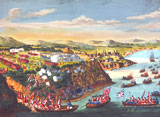|
|
|
|
|
|
|
|
|
The End of the War First Peoples French Canadians Canada The United States of America The End of the War
A View of the Bishop's House with the Ruins as they appear in going
up the Hill from the Lower, to the Upper Town Painting by Richard Short Courtesy of Library and Archives Canada, C-000350 The last fighting of the North American theatre occurred in 1762 when a French expedition captured St. John's, Newfoundland. A British force first seized Signal Hill, then recaptured St. John's later that year. Negotiations for peace were already underway. On 10 February 1763 the Treaty of Paris ended the Seven Years' War. First PeoplesIn what is now Canada, as the French surrender, First Peoples form new alliances with the British. They are independent powers, free to negotiate to protect their interests. When the British fail to live up to their obligations as allies, the Great Lakes First Peoples begin a new war against the British in 1763. The British respond with the Royal Proclamation, the first step towards the acknowledgment of Aboriginal Title by the Crown. French CanadiansThe British permitted the Acadians to return to the Maritimes after the end of the war. That apart, the conquest was a catastrophe for French Canadians. Canada was been ripped away from France and turned into a small province in Britain's North American Empire. But if New France had vanished, French Canada survived. Within a generation of the Conquest, Canadiens produced new leaders like Louis-Hippolyte La Fontaine and George-Etienne Cartier. They used British parliamentary institutions and alliances with English-speaking reformers to preserve the French language and culture. CanadaThe Conquest made Canada a British colony with British institutions, including parliamentary government and the monarchy, and a dominant Anglophone population. Most English-speaking Canadians thought of themselves as British until after the Second World War. Their strong identification with Britain led to Canada's participation in the First and Second World Wars. The United States of AmericaFor Americans, the Seven Years' War was a triumph that set them on the road to independence. With the French threat eliminated, the American colonies no longer needed British protection. Angry at British attempts to control the colonies and collect taxes, many Americans rebel in 1775. |
|||||||||||||||||||||||||||||||||||||||||||||||||||||||||||||||||||||||||||||||||||||||
